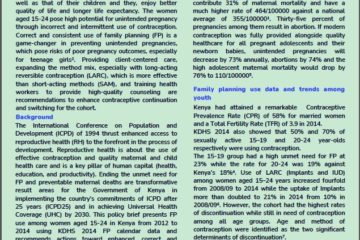
Webinar: Leveraging High Impact Practices for Family Planning and Family Planning 2020 for Population, Health, and Environment Projects
Date
January 17, 2017
Author
Understanding the broad range of actors in the family planning landscape is critical to improving program advocacy and implementation. Staff at family planning organizations may be quite familiar with Family Planning 2020 (FP2020) and the High Impact Practices for Family Planning (HIPs), but not all members of the Population, Health, and Environment (PHE) community of practice are familiar with how to leverage FP2020 and the HIPs to implement and advocate for PHE projects. To bridge this gap, the PACE Project hosted an Africa PHE quarterly webinar with Jason Bremner (director, Data Performance and Management, FP2020) and Caitlin Thistle (technical advisor, Office of Population and Reproductive Health, USAID). Smita Gaith (policy analyst, PRB) moderated.
Gaith kicked off the webinar with a broad overview of PHE integration, including its benefits. Bremner explained the history and function of FP2020, which was established following the 2012 London Summit on Family Planning. Bremner highlighted how PHE projects can benefit from FP2020 resources, such as the FP2020 “Rapid Response Mechanism,” which offers grants in response to certain emerging, time-bound, or unanticipated opportunities, and the “Data and Measurement Hub,” which provides global data on progress towards reaching an additional 120 million girls and women in the world’s 69 poorest countries with family planning information, services, and supplies by 2020. In addition, Bremner explained how PHE implementers and advocates could work at the national level to include PHE in country-level “Costed Implementation Plans,” a tool designed to help governments develop strategies to transform national commitments to family planning into programs and policies. Finally, FP2020’s “Knowledge Resources” section of their website is an excellent source of information and includes several PHE documents to accelerate action on family planning.
Thistle provided an overview of the HIPs. These are evidence-based family planning practices that are vetted by experts against specific criteria and documented in an easy-to-use format. The current set of HIPs reflects practices which create an enabling environment for family planning (such as galvanizing support), improve service delivery (such as training community health workers), and improve social and behavior change programs (such as community group engagement). In addition, HIP enhancements are practices that can be implemented alongside an established HIP to amplify it. These practices, Thistle explained, can be used for strategy development, program design, advocacy, and implementation support. During her presentation, Thistle described how three PHE projects are already using and benefitting from established HIPs (Blue Ventures in Madagascar, HoPE-LVB in Kenya and Uganda, and the PHE Ethiopia Consortium in Ethiopia).
Following the presentation, guest presenters responded to a series of questions, which covered how strong sexual and reproductive health projects or programs could get involved in PHE integration, whether or not PHE could be identified as a HIP, and detailed questions about the resources available on the FP2020 website.
This webinar is part of the Africa PHE quarterly webinar series implemented under the Policy, Advocacy, and Communication Enhanced for Population and Reproductive Health (PACE) Project. For regular updates about PHE news, opportunities, resources, and other events, sign up for the monthly Africa PHE Updates newsletter by emailing AfricaPHE@prb.org and follow @AfricaPHE on Twitter.



